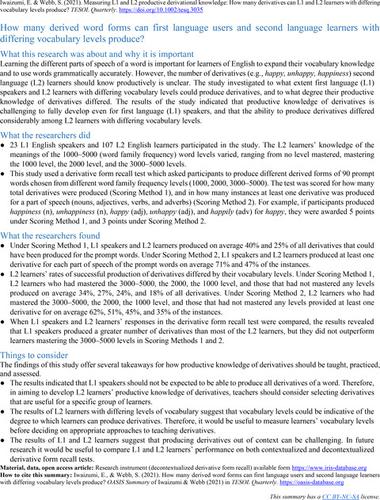Our official English website, www.x-mol.net, welcomes your
feedback! (Note: you will need to create a separate account there.)
Measuring L1 and L2 Productive Derivational Knowledge: How Many Derivatives Can L1 and L2 Learners with Differing Vocabulary Levels Produce?
Tesol Quarterly ( IF 3.0 ) Pub Date : 2021-06-01 , DOI: 10.1002/tesq.3035 Emi Iwaizumi 1 , Stuart Webb 1
Tesol Quarterly ( IF 3.0 ) Pub Date : 2021-06-01 , DOI: 10.1002/tesq.3035 Emi Iwaizumi 1 , Stuart Webb 1
Affiliation

|
Derivational knowledge, the ability to understand and produce derivatives of a word, is essential for vocabulary learners to expand their lexical knowledge. Earlier research (e.g., Schmitt & Zimmerman, 2002) has shown that L2 learners may have limited ability to produce derivatives compared to L1 speakers. However, the degree to which productive derivational knowledge differs between L1 and L2 learners, and among learners at different levels of vocabulary knowledge has yet to be examined. The present study investigated the extent to which L1 English speakers (n = 23) and L2 English learners (n = 107) at varying vocabulary levels (1000-5000) could produce the derivatives of 90 headwords in a decontextualized derivative recall test. A generalized linear mixed model indicated that L1 and L2 productive derivational knowledge significantly differed, and L2 productive derivational knowledge differed among learners with different vocabulary levels. However, the results revealed that the L1 speakers and the learners who had mastered the higher vocabulary levels (3000–5000) produced a similar number of derivatives in the decontextualized recall test. The findings suggest that learners’ vocabulary levels could be indicative of L2 productive derivational knowledge to some degree. Lastly, the results are discussed to provide pedagogical implications for teaching and assessing L2 productive derivational knowledge.
中文翻译:

衡量 L1 和 L2 生产性派生知识:具有不同词汇水平的 L1 和 L2 学习者可以生产多少衍生品?
派生知识,即理解和产生单词派生词的能力,对于词汇学习者扩展词汇知识至关重要。早期的研究(例如,Schmitt & Zimmerman, 2002)表明,与 L1 说话者相比,L2 学习者产生衍生词的能力可能有限。然而,生产性派生知识在 L1 和 L2 学习者之间以及不同词汇知识水平的学习者之间的差异程度还有待检验。本研究调查了 L1 英语使用者 (n = 23) 和 L2 英语学习者 (n = 107) 在不同词汇水平 (1000-5000) 可以在去上下文衍生回忆测试中产生 90 个词条的衍生词的程度。广义线性混合模型表明,L1 和 L2 生产性派生知识存在显着差异,不同词汇水平的学习者的第二语言生产性派生知识存在差异。然而,结果表明,L1 的使用者和掌握较高词汇水平(3000-5000)的学习者在去语境化回忆测试中产生了相似数量的衍生品。研究结果表明,学习者的词汇水平可以在一定程度上反映二语生产性派生知识。最后,讨论结果为教学和评估二语生产性衍生知识提供教学意义。结果表明,L1 的使用者和掌握较高词汇水平(3000-5000)的学习者在去语境回忆测试中产生了相似数量的衍生品。研究结果表明,学习者的词汇水平可以在一定程度上反映二语生产性派生知识。最后,讨论结果为教学和评估二语生产性衍生知识提供教学意义。结果表明,L1 的使用者和掌握较高词汇水平(3000-5000)的学习者在去语境回忆测试中产生了相似数量的衍生品。研究结果表明,学习者的词汇水平可以在一定程度上反映二语生产性派生知识。最后,讨论结果为教学和评估二语生产性衍生知识提供教学意义。
更新日期:2021-06-01
中文翻译:

衡量 L1 和 L2 生产性派生知识:具有不同词汇水平的 L1 和 L2 学习者可以生产多少衍生品?
派生知识,即理解和产生单词派生词的能力,对于词汇学习者扩展词汇知识至关重要。早期的研究(例如,Schmitt & Zimmerman, 2002)表明,与 L1 说话者相比,L2 学习者产生衍生词的能力可能有限。然而,生产性派生知识在 L1 和 L2 学习者之间以及不同词汇知识水平的学习者之间的差异程度还有待检验。本研究调查了 L1 英语使用者 (n = 23) 和 L2 英语学习者 (n = 107) 在不同词汇水平 (1000-5000) 可以在去上下文衍生回忆测试中产生 90 个词条的衍生词的程度。广义线性混合模型表明,L1 和 L2 生产性派生知识存在显着差异,不同词汇水平的学习者的第二语言生产性派生知识存在差异。然而,结果表明,L1 的使用者和掌握较高词汇水平(3000-5000)的学习者在去语境化回忆测试中产生了相似数量的衍生品。研究结果表明,学习者的词汇水平可以在一定程度上反映二语生产性派生知识。最后,讨论结果为教学和评估二语生产性衍生知识提供教学意义。结果表明,L1 的使用者和掌握较高词汇水平(3000-5000)的学习者在去语境回忆测试中产生了相似数量的衍生品。研究结果表明,学习者的词汇水平可以在一定程度上反映二语生产性派生知识。最后,讨论结果为教学和评估二语生产性衍生知识提供教学意义。结果表明,L1 的使用者和掌握较高词汇水平(3000-5000)的学习者在去语境回忆测试中产生了相似数量的衍生品。研究结果表明,学习者的词汇水平可以在一定程度上反映二语生产性派生知识。最后,讨论结果为教学和评估二语生产性衍生知识提供教学意义。











































 京公网安备 11010802027423号
京公网安备 11010802027423号